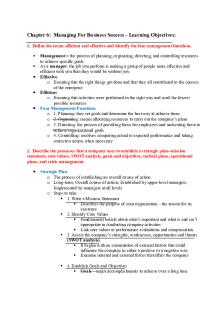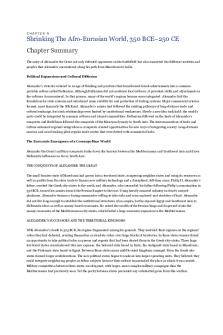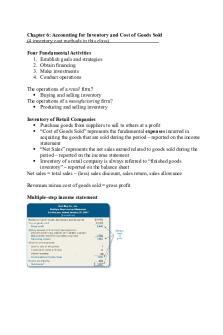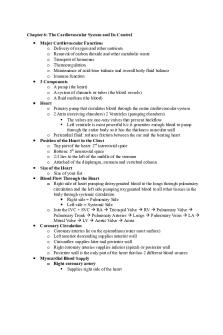Chapter 5 & 6 - Lecture notes 5-6 PDF

| Title | Chapter 5 & 6 - Lecture notes 5-6 |
|---|---|
| Author | Nicole Kuliyev |
| Course | The Psychology Of Personality |
| Institution | Queens College CUNY |
| Pages | 5 |
| File Size | 66.5 KB |
| File Type | |
| Total Downloads | 618 |
| Total Views | 844 |
Summary
Chapter 5 & 6: The Psychoanalytic Approach: Neo- Freudian TheoryLimits and Liabilities of Freudian Theory ● Neo-Freudians rejected the idea that personality is formed by experiences in the initial years of life ● Freud failed to recognize the importance of social and cultural forces in shapi...
Description
Chapter 5 & 6: The Psychoanalytic Approach: Neo- Freudian Theory Limits and Liabilities of Freudian Theory ● Neo-Freudians rejected the idea that personality is formed by experiences in the initial years of life ● Freud failed to recognize the importance of social and cultural forces in shaping individual personality ● Freudian theories have negative tone and painted a pessimistic and in some ways degrading picture of human nature ○ Propagated that humans are largely controlled by instincts and unconscious forces Erik Erikson ● Believed that ego is a relatively powerful, independent part of personality ● You never stop developing ● Ego Psychology: Erikson’s approach to personality ○ Principal function of the ego is to establish and maintain a sense of identity ○ Identity crisis: confusion and despair we feel when we lack a strong sense of who we are ● That ego depending on how old you are , will have a different view of what is right ● To Freud the ego does what it does, Erikson believes the ego is what you make through your life experiences and everyone has different egos bc we have all gone through stages of life differently Personality Development Throughout the Life Cycle ● Erikson’s stages of personality development continue from infancy to old age ● Crises- Turning points ● Like all Freudians, emphasises on early childhood experiences ● Children develop an unconscious representation of significant objects in his / her own environment ○ The kind of attachment children feel with their parents (FINISH) Attachment Theory ● Freudian theory feed into attachment theory, which describes the attachment between infants and their caregivers Adult Attachment Style Research Indicates that: ● Secure adults describe positive relationships with parents and a warm trusting family
environment ● Anxious ambivalent people recall little parental support ○ Feel that their parents weren’t supportive ● Avoidant people describe their relationships with family members and distrustful and emotionally distant Carl Jung ● First president of the International Psychoanalytic Association ○ “Heir” to PA ● Disagreement with Freud’s theory resulted in resignation from the association in 1914 ● Established analytic psychology Collective Unconscious ● Part of unconscious mind ○ Believes we have a personal subconscious and a part of us that knows what a mother is supposed to do (Mother example) ○ Personal unconscious and collective unconscious ■ We’re born with this knowledge bc it is passed from our ancestors , bc it is in it not bc they teach us (its innate), unconscious thing that's driving you that you’ve never been aware of ● Constitutes of thoughts, images, and psychic characteristics that are difficult to bring into awareness ○ Never repressed out of unconsciousness ■ Different from Freud bc Jung believed this was never a choice, you were born this way and you inherit it ○ People inherit unconscious psychic characteristics ○ Made of primordial images ■ Images you conceived before you even knew what they were ■ Referred as archetypes Some Important Archetypes ● Anima - feminine side of the male ● Animus- masculine side of the female ○ Anima and animus guide the selection of a romantic partner and the course of the subsequent relationship ● Persona- public image ○ Teaches us what to do in front of other people ● Shadow- negative side of personality ○ Located partly in both personal and collective unconscious
● Coined the terms introversion and extroversion ○ Different from introvert and extrovert we know today ○ Introverts prefer “internal world” ■ Someone who reflected towards the inside ○ Extroverts prefer “external world” ■ Someone who reflected outside ■ Looked for peoples opinion , etc Believes there needs to be balance of both of these things , most of his theories he believed the happiest people were the ones who had a balance However just like Freud, Jung’s concepts were not testable ● Does the ego face inward (collective unconscious) or outward (Persona)? Alfred Adler ● First one to leave Freud, his key difference was the source of motivation ○ Believed motivation was the need for superiority , to do well, and be successful instead of sex ● Developed the approach of individual psychology ● Key difference between him and Freud: source of motivation ● Contributions to understanding of personality ○ Notion of striving for superiority ○ Role of parental influence on personality development ○ Effects of birth order Striving for Superiority ● Single motivating force that can subsume all other motives ○ Individuals begin life with feelings of inferiority ■ All individual actions aim to establish a sense of superiority over life’s obstacles ● More inferior we perceive = more superiority we strive for ● Excessive feelings of inferiority lead to inferiority complex ● Social interest combined with a superiority striving indicates mental health of a person ● The motivator of your personality is how inferior you feel and how important it is for you to show superiority ● Social interest + success =mental health *** ○ Not about doing well, you have TO LIKE what you are doing well Parental Influence on Personality Development ● Like Freud , early years are crucial
● Parental behaviors that lead to problems in children’s life ○ Pampering ■ When you pamper children, you create entitled adults ○ Neglect ■ Kids who are neglected will have trouble in romantic relatiosnhips bc of lack of trust
Birth Order ● First psychologist to emphasize birth order ○ First born children ■ Pampered, then “dethroned” ■ Highest level of inferiority ● Middle born children ○ Play “catch up” their whole lives ○ Highest achievers ● Last Born ○ Pampered by everyone ○ Strong tendency to inferiority ● Not much support for this in the research Karen Horney ● Studied Freud's work and taught psychoanalysis ○ Began to disagree with Freud’s ideas about women ● Believed social and cultural forces explained differences in personality ○ Believed social and culture explained human behavior ● Founded american institute for Psychoanalysis ● A lot of her research deals with eating disorders ● Important contributions ○ Neurosis and feminine psychology Neurosis ● Neurotic people are trapped in a self-defeating interpersonal style ○ Prevents peoples from developing the social contract they unconsciously crave ● Destructive interpersonal style is a defense mechanism to ward off feelings of anxiety ○ Arises due to disturbed interpersonal relationships during childhood
○ Basically you take part in the self deprecating behavior in order to worry less , bc you’ve accepted that you’re bad ■ We use this to protect ourselves from letting ourselves down ● Interaction styles adopted by neurotics to avoid anxiety-provoking experiences ○ Moving toward peoples ○ Moving against people ○ Moving away from people ● Common to use some of these someones; neurotic individuals use 1 style all the time ● What is uncommon, is using only one of these consistently to avoid anxiety provoking situations ● Moving toward people : dependent, clingy ● Moving against people : aggressive, mean , deal with anxieties with anger ● Moving away from people: ignoring, staying away so no emotional attachment Feminine Psychology ● Introduced the concept of womb envy ○ Men envy women’s ability to bear and nurse children ○ Men compensate their inability to have children through achievement in other domains ● In a society where men and women are free to become whatever they desire girls would not want to be boys, or vice versa ● Her motivator of behavior is culture Main motivator for Karen: social forces, gender, culture Strengths and Criticisms of Neo-Freudian Theories ● Strengths ○ Elaboration of vital concepts ignored by Freud ■ Social forces; life span, etc ■ Bridge between Freud and later personality theories ● Optimistic and flattering picture of humankind ● Introduction of new concepts like identity crisis, introverts, and inferiority complex ● Criticisms ○ Neo freudian theories are supported with questionable evidence ■ Mostly subjective ● Oversimplified or ignored important concepts...
Similar Free PDFs

Chapter 6 - Lecture notes 5
- 3 Pages

Chapter 6 - Lecture notes 5
- 8 Pages

MCQs6&5 - Lecture notes chapter 5 &6
- 10 Pages

Chapter 56 - textbook notes
- 4 Pages

Lecture 5 + 6 notes
- 12 Pages

Chapter 6 & 7 - Lecture notes 5
- 8 Pages

A&P Chapter 5 - Lecture notes 6
- 4 Pages

Chapter 6 - Lecture notes 6
- 5 Pages

Chapter 6 - Lecture notes 6
- 6 Pages

Chapter 6 - Lecture notes 6
- 9 Pages

Chapter 6 - Lecture notes 6
- 11 Pages

Chapter 6 - Lecture notes 6
- 4 Pages

Chapter 6 - Lecture notes 6
- 3 Pages
Popular Institutions
- Tinajero National High School - Annex
- Politeknik Caltex Riau
- Yokohama City University
- SGT University
- University of Al-Qadisiyah
- Divine Word College of Vigan
- Techniek College Rotterdam
- Universidade de Santiago
- Universiti Teknologi MARA Cawangan Johor Kampus Pasir Gudang
- Poltekkes Kemenkes Yogyakarta
- Baguio City National High School
- Colegio san marcos
- preparatoria uno
- Centro de Bachillerato Tecnológico Industrial y de Servicios No. 107
- Dalian Maritime University
- Quang Trung Secondary School
- Colegio Tecnológico en Informática
- Corporación Regional de Educación Superior
- Grupo CEDVA
- Dar Al Uloom University
- Centro de Estudios Preuniversitarios de la Universidad Nacional de Ingeniería
- 上智大学
- Aakash International School, Nuna Majara
- San Felipe Neri Catholic School
- Kang Chiao International School - New Taipei City
- Misamis Occidental National High School
- Institución Educativa Escuela Normal Juan Ladrilleros
- Kolehiyo ng Pantukan
- Batanes State College
- Instituto Continental
- Sekolah Menengah Kejuruan Kesehatan Kaltara (Tarakan)
- Colegio de La Inmaculada Concepcion - Cebu


